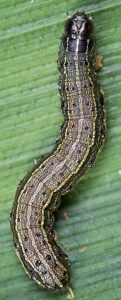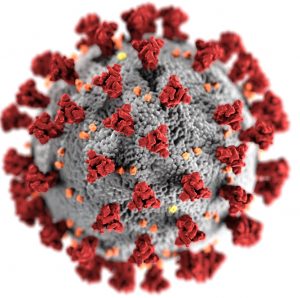
Auburn Entomologists have rallied because Fall Armyworm (FAW) numbers are up; about 5 times higher than they were this time last year. FAW numbers are high across the region, from Texas to Alabama up through Tennessee and Kentucky. Wet weather has complicated the situation. It has created more lush green fields than we are used to this late in July and some growers have been unable to access wet fields.
The COVID-19 Delta variant is spreading like wildfire across Alabama. Alabama’s 7-day average for new cases surpassed 1,900 this week, which is even higher than it was in last July’s surge. Cases in Alabama have increased 165% in the past week. Our state now has the highest positivity rate in the country at near 20%. One out of every five COVID tests is positive.
The fall armyworm is a chronic pest in the Southeast and can cause severe damage to grass and forage crops. Damage varies in appearance and severity according to the type of grass and management practices. They are most numerous in late summer or early fall. More than 60 plants have been reported as hosts of the fall armyworm, including forage grasses, corn, alfalfa, cotton, soybeans, and most vegetable crops. There are two strains of the fall armyworm, the rice strain and the corn strain. The rice strain caterpillars feed on a variety of forage crops, but seem to prefer lush, green, well-fertilized bermudagrass. Other forage grasses that are hosts for fall armyworm are bahiagrass, pearl millet, sorghum-sudan hybrids, tall fescue, and various winter annuals including ryegrass, rye, wheat, and oats.
 Hospitalizations rose to nearly 1,200 this week, and 26 of those patients were pediatric. Forty-eight people have died from COVID since last Friday. The CDC reports that most Alabama counties have a substantial to high level of community transmission. The highly transmissible Delta variant now represents more than 80% of current COVID infections. Sadly, at just 34%, Alabama has the lowest vaccination rate in the nation. A combined total of more than 50% of our current clients have underlying medical conditions that put them at severe risk from COVID. These conditions include chronic kidney disease, chronic obstructive pulmonary disease (COPD), heart disease, diabetes, and obesity.
Hospitalizations rose to nearly 1,200 this week, and 26 of those patients were pediatric. Forty-eight people have died from COVID since last Friday. The CDC reports that most Alabama counties have a substantial to high level of community transmission. The highly transmissible Delta variant now represents more than 80% of current COVID infections. Sadly, at just 34%, Alabama has the lowest vaccination rate in the nation. A combined total of more than 50% of our current clients have underlying medical conditions that put them at severe risk from COVID. These conditions include chronic kidney disease, chronic obstructive pulmonary disease (COPD), heart disease, diabetes, and obesity.
Alabama Cooperative Extension (ACES) the only distributor of private pesticide exams and the Alabama Department of Agriculture and Industries (ADAI) are working closely together to allow growers to test in the grower’s county. After passing the test, the Extension Office can immediately call ADAI to obtain a permit number for the grower to purchase restricted use products. Bibb County Extension (205) 926-4310 is taking sign-ups for the Private Pesticide Applicator exam. Additionally, the ACES website has numerous articles on Managing Fall Armyworms including how to scout for them, controlling them with pesticides and mechanical control options, whether you have pastures, commercial turf, home turf or soybeans. Products labeled for pastures can be found in the Alabama Extension Pastures and Forage Crop IPM Guide.
Vaccination is our best path to ending the COVID-19 pandemic. The CDC bases its recommendations on the latest data. New data = new guidance. When the CDC revised its guidance in May, the Delta variant represented 1% of all cases. Today that number is more than 80%. The CDC continues to recommend that policies be based on local transmission rates. The vaccines work. New data are showing that a small number of vaccinated people can get the Delta variant and may be contagious, but these cases represent a very small amount of transmission occurring around the country. Wear a mask. Given the high transmission rates, everyone, including fully vaccinated individuals, should wear a mask in public indoor settings to help prevent the spread of Delta and protect others.
Historically, Extension has helped stakeholders apply science to threats ranging from avian influenza and mad cow disease to crop pests that threaten our food supply and poor nutrition that threatens our health. The stakes are as high as they have ever been. Get the Shot.
https://www.aces.edu/go/2136 provides scientific based information on COVID-19 and the vaccine.
https://www.aces.edu/go/2118 provides scientific based information on combatting Fall Armyworms.
















